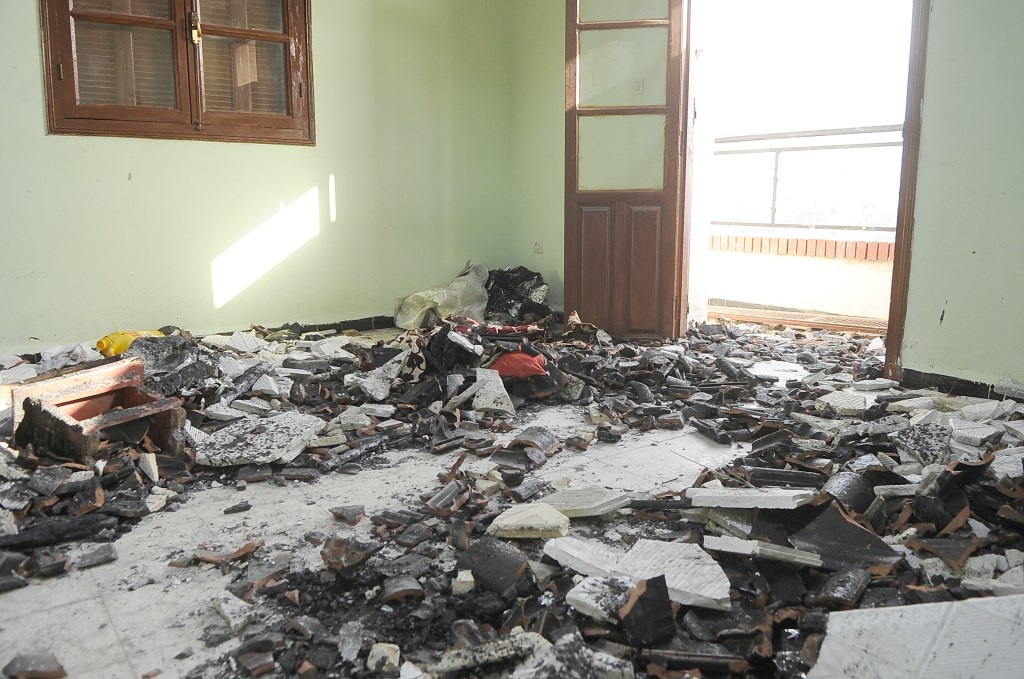A day after Egypt released an Al Jazeera journalist accused of false reporting and aiding the Muslim Brotherhood, an Egyptian court upheld death sentences Monday for 183 supporters of the banned political party, the latest round of mass sentencing since the 2013 ouster of former President Mohammed Morsi.
The accused were initially convicted in December of ransacking a police station in village of Kerdasa, near Cairo, in August 2013. Fourteen officers and the police chief were killed in the melee. Monday’s sentences came after the original verdicts were sent to the Grand Mufti, Egypt’s top cleric, for approval — a formality that has typically followed each mass trial.
Videos by VICE
The police station incident occurred a month after Morsi was forced out by a coup, following months of civil unrest and demonstrations against his rule. Members and supporters of his Islamist party staged a series of protests and sit-ins that were met with deadly force by police and security forces. The assault in Kerdasa reportedly occurred hours after one of the protests was forcibly cleared.
After the verdicts were issued Monday, Brotherhood members held in cages in the courtroom screamed profanities at police from behind the metal bars, according to Reuters. A defense lawyer reportedly turned to the Islamist supporters and said, “You have God.”
Egypt releases jailed Al Jazeera correspondent Peter Greste. Read more here.
Amnesty International has condemned the trial as “a further sign of Egypt’s disregard for national and international law.”
“These verdicts and sentences must be quashed and all of those convicted should be given a trial that meets international standards of fairness and excludes the death penalty,” Hassiba Hadj Sahraoui, Amnesty’s deputy Middle East and North Africa program director said in a statement Monday.
The trial took place in a prison complex, rather than a courtroom, and some defendants were sentenced in absentia, Amnesty said.
Thousands of Muslim Brotherhood members have been imprisoned and sentenced to life in jail or death in mass trials for their role in the violence that broke out in 2013 after Morsi’s successor, Abdel Fattah el-Sisi, came to power.
Morsi is also currently standing trial on allegations of espionage, killing protesters during the demonstrations that led to the 2013 coup, conspiring with international actors to destabilize the country, and involvement in assaults on police stations during a previous uprising that ousted former President Hosni Mubarak in 2011.
Conversely, no police officers have been punished for the killing of 1,000 people — mostly Islamists — during the mass protests in August 2013, Amnesty said.
The verdicts Monday were issued by Judge Mohammed Nagi Shehata, who also presided over the case last year involving three Al Jazeera journalists who were each sentenced to up to 10 years in prison for allegedly aiding a terror organization — the Muslim Brotherhood — while reporting on the protest crackdown.
On Sunday, one of the journalists, Peter Greste, was released and flown back to his home country of Australia after 400 days in detention. The other two, Baher Mohamed and Mohamed Fahmy, remain imprisoned in Egypt.
Egypt’s mass death sentence threatens to provoke more violence. Read more here.
Last March, after a trial that lasted just two days, 529 Muslim Brotherhood members were sentenced to death at a mass trial. It was the largest simultaneous sentencing event in the country’s history, but the record stood for barely a month. In April 2014, an Egyptian court sentenced 683 people to death for a separate mob attack at the police station. Many of the death sentences handed down at these trials have since been reduced or overturned on appeal.
While leaders from some Western countries have outwardly condemned the sentencings, some see the overall international response to the continued mass trials as inadequate.
“The US and the EU have acquiesced to the coup and to the subsequent crackdown — everyone knows that, and the Egyptian regime certainly knows that,” Shadi Hamid, a fellow at the Brookings Institution’s Saban Center, told VICE News last year after the first mass sentencing. “If there was a real, serious, international uproar and the international community outlined consequences for the Egyptian government, then they would have to be concerned, but quite honestly there’s little sign of that happening.”
Egypt has a massive political prisoner dilemma. Read more here.
VICE News’ Alice Speri contributed to this report.
Follow Liz Fields on Twitter: @lianzifields



